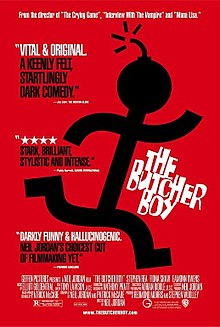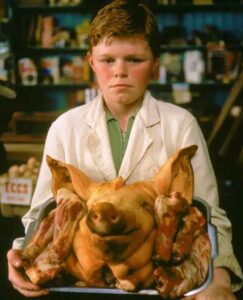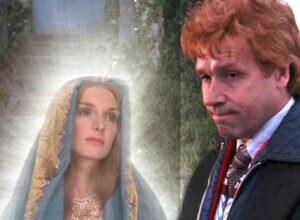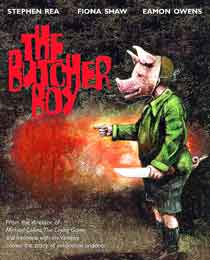 The brief acting career of the late Sinéad O’Connor reached its apex in this rancid little film from Ireland’s Neil Jordan, made with spare change from mega-mogul David Geffen (producer of Jordan’s INTERVIEW WITH THE VAMPIRE). Jordan cast Ms. O’Connor in a recurring cameo as the Virgin Mary, a perverse decision considering her real-life notoriety, but one that makes perfect sense given the film’s black humored gist.
The brief acting career of the late Sinéad O’Connor reached its apex in this rancid little film from Ireland’s Neil Jordan, made with spare change from mega-mogul David Geffen (producer of Jordan’s INTERVIEW WITH THE VAMPIRE). Jordan cast Ms. O’Connor in a recurring cameo as the Virgin Mary, a perverse decision considering her real-life notoriety, but one that makes perfect sense given the film’s black humored gist.
THE BUTCHER BOY’s basis was a very Irish-centric 1992 novel by Patrick McCabe that to these eyes read like a more literary variant on THE WASP FACTORY. Nevertheless, McCabe’s novel proved ideal material for Jordan’s cynical and macabre yet bleakly humorous sensibilities (it’s everything Jordan’s HIGH SPIRITS and IN DREAMS wanted to be), and resulted in one of his more memorable films.
Francie Brady (Eamonn Owens) is a highly demonstrative 12 year old boy living in a scenic Irish border town with his bipolar mother (Aisling O’Sullivan) and alcoholic father (Jordan regular Stephen Rae, who also plays the grown-up Francie). That Francie is an irrepressible troublemaker, and insane, is established early on, when he terrorizes a shy classmate named Phillip Nugent (Andrew Fullerton) and his prissy mother (Fiona Shaw), on whom Francie fixates after she calls him and his family “pigs.” His mental state isn’t helped by the fact that, after he decides to run away for a stretch, Francie returns to find that his mother has committed suicide and he’s now in the care of his deadbeat father.
Francie acts out his inner turmoil by trashing the home of the hated Mrs. Nugent, ultimately getting caught in the act of taking a dump on her floor, for which he’s sent to a Catholic reform school. There he’s molested by a pervy priest (Milo O’Shea), but finds a companion in visions of Sinéad O’Connor’s Virgin Mary, who gives him advice, and does so in his preferred vernacular (“For fuck’s sake!” being one of her utterances). Upon arriving back home his mind deteriorates further, with anxiety about nuclear war (triggered by the then-unfolding Cuban Missile Crisis), the untimely death of his father and the fact that his best friend Joe (Alan Boyle) has befriended Phillip Nugent pushing Francie over the edge entirely.
Bleak though all this is, it’s given a humorous tone by the sarcastic narration from grown-up Francie, and a disarmingly up-tempo score. The film plays like a warped variant on the traditional boy’s adventure mold, in which said boy is faced with various challenges on his road to maturity, challenges that here includes insanity (most notably his own), death, murder and dismemberment (the latter acts committed by Francie himself).
Jordan was reportedly quite exacting in constructing the film, reshooting, if not excising entirely, those scenes that didn’t fit the very particular seriocomic tone he’d worked out. Aiding in that endeavor is Eamonn Owens as Francie, who adroitly conveys the character’s maturation (the McCabe novel followed Francie through his teenage years, something Jordan didn’t have the time or money to do), even if he doesn’t quite convince in some of the later scenes, in which we’re asked to believe this boy is able to beat up men much bigger than he.
Even more problematic is the fact that despite their best efforts, Owens and Jordan never succeed in rendering Francie empathetic. They set themselves an extremely difficult challenge in getting viewers to root for a character who’s a bully and a murderer, and I’m afraid they didn’t quite succeed.
Vital Statistics
THE BUTCHER BOY
Geffen Pictures
Director: Neil Jordan
Producers: Redmond Morris, Stephen Wooley
Screenplay: Neil Jordan, Patrick McCabe
(Based on a Novel by Patrick McCabe)
Cinematography: Adrian Biddle
Editing: Tony Lawson
Cast: Eamonn Owens, Sean McGinley, Peter Gowen, Alan Boyle, Andrew Fullerton, Fiona Shaw, Aisling O’Sullivan, Stephen Rea, John Kavanagh, Rosaleen Linehan, Anita Reeves, Gina Moxley, Niall Buggy, Ian Hart, Anne O’Neill, Joe Pilkington, Patrick McGrath, Jer O’Leary, Brendan Gleeson, Sinéad O’Connor



